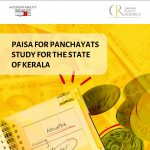
Seventeen Signatures
16 May 2016
At first sight, this looks like a digression from my continuing tale of the tortuous way in which public expenditure happens in India, but read on.
Last week, a good friend of mine and I caught up to exchange notes. He had had a torrid time for a few days, he said. His son, a brilliant student in a top-notch university abroad, had suddenly taken ill and was admitted to hospital. My friend was worried sick and decided to make a dash to the US, to be with his son. Being a government officer, he had to obtain prior permission to travel abroad. When he checked up with his department, he found to his consternation that the process would take upward of three weeks.
That was when a Good Samaritan appeared on the scene; a Government Fixer. He undertook to carry the file from table to table to obtain the requisite permissions and did that is a space of three hours.
My friend told me that securing the permission to travel abroad took seventeen signatures.
Now my friend works as the head of vigilance in a large government department. He himself is in a position where he has to ensure that people follow the rules and take instant action in case they don’t. He was well aware of the fact that any slippage in obtaining the required number of signatures would lead to fingers being pointed at him.
‘But how many signatures are actually material to the decision to let you go abroad?’ I asked my friend.
‘Three’, he said, after a pause. ‘One from the Human Resources section to check whether there are any pending cases of disciplinary action, one from the Vigilance Section, to ensure that I am not involved in any enquiry and then the third, by my boss, who finally approves my travel.’
Three signatures would suffice, but seventeen are required.
The layering of decision making is a persistent reality of the government. It is something that everybody speaks of eliminating, but which is rarely eliminated. There are two reasons why such arrangements tenaciously persist. First, it enables people to avoid responsibility. In my friend’s case, it feels much nicer for his boss to have seventeen people to blame, in case something goes wrong, rather than three people. Second, it enables the continuing usefulness of government Fixers.
Nobody knows what motivates an individual to become a Government Fixer. What such an individual does is to study processes intimately, and then become an expert in how to negotiate the system. Every department has a Government Fixer, adept at chasing papers within the department. I have met many Government Fixers and as a rule, they are honest brokers, with altruistic motives and generally combine a philosophical air with extreme practicality. They provide gratuitous help and often, their only reward is the deep appreciation for the benefaction they dispense. They are unfailingly polite and non-discriminatory. They help everybody, regardless of their ethical foundation. They maintain excellent relations with people who really matter in each department; those who prepare the files and deal with their movement. They are particularly friendly with the Private Secretaries of senior officers, those, who can in the twinkling of an eye, move a file from the bottom of the pile to the top, and get a signature just as the officer heads out to his car at the end of a tough day.
Come to think of it, I owe my career progression to the good deeds of a few Government Fixers. More of that next time.
Post script: My friend’s son got better in double quick time and my friend did not have to go abroad after all. The Government Fixer’s efforts though effective, were thankfully redundant.





